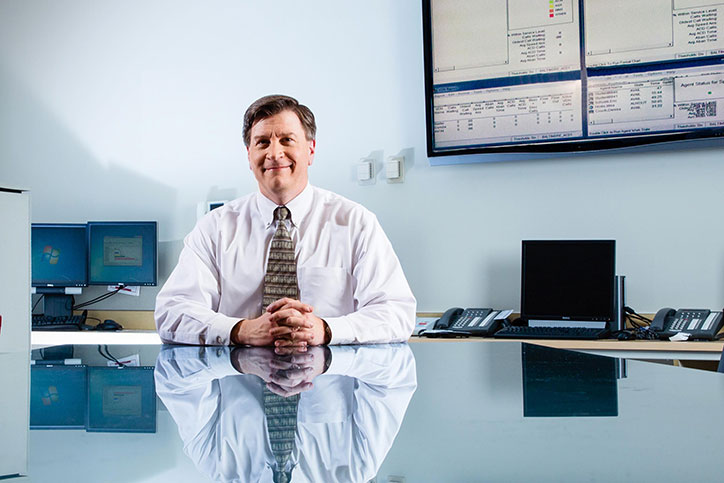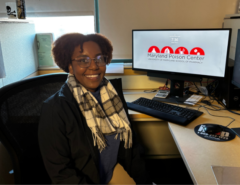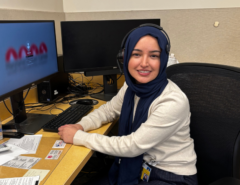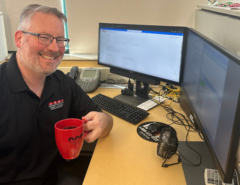One of the goals of our eAntidote blog is to introduce you to the real poison experts who answer the phones at the Maryland Poison Center (MPC), as well as our staff members. In addition to being nurses and pharmacists, they are parents, grandparents, artists, athletes, sports fans, and more! Read the Q&A below to get to know our executive director, Bruce Anderson.
Why did you go into the field of pharmacy?
My first real exposure to pharmacy was working in my neighborhood pharmacy, cleaning shelves, driving deliveries, and working as a cashier. I started asking the pharmacist questions about what he was doing and the different medications in the pharmacy. The pharmacist suggested that I read some of the package inserts on the medications, so I did. After I learned a bit about what the pharmacist did and how medicines worked, I decided to apply to pharmacy school. Once in school, I learned about many different types of pharmacy practice. I had a chance to work at Thomas Jefferson University Hospital, where I was able to work in many different specialty areas. It was there that I got hooked on the idea of being directly involved in patient care.
How did you end up at the poison center?
While in pharmacy school, I had an opportunity to do a rotation at the poison center in Philadelphia. At the time, the poison center was very modest. It was a singlewide trailer in the parking lot of the Philadelphia Children’s Hospital. There was no running water, little heat or air conditioning, and the space was cramped. Yet, the people were amazing! They were dealing with incredibly challenging and complex cases one minute, then they would switch gears to help an anxious mom deal with a child that had just ingested a substance that would do no real harm. I got to know the director of the center, and ask him about his job. He was responsible for running the center and was active in teaching, as well as research. I knew what I wanted to do from there.
What do you enjoy most about your work?
I don’t think there is just one thing that I enjoy most! Working with exceptional people is amazing. The staff at the MPC are truly exceptional. I believe that’s part of the reason why so many folks stay here for so long. Dr. Wendy Klein-Schwartz was a professor here for 39 years before “retiring” to become Professor Emeritus. Dr. Lisa Booze was here for 38 years as a poison specialist and a health professional educator. Kevin Simmons will be retiring this year after 30 years. The people at the poison center are terrific!
But, I also love the regular challenges of the position. I’m a pharmacist, but most of my day-to-day activities involve the business side of the poison center: scheduling, budget, and technology. Solving problems that arise can be quite challenging, but also a lot of fun. When I started here in 1993, the poison center used paper-based forms to document calls to the center. We needed to create processes to allow folks to document information electronically. To do this, we needed to get new computers. We had to set up a network and create servers. I didn’t really know anything about what was needed; I just knew that we needed it. So, I learned what I could to try to make good decisions for the center and then moved forward.
My job also allows me to work with students almost every day. We have a lot of students and residents who rotate through the MPC. It’s pretty amazing to have a chance to influence the education of so many learners. I am also able to teach classes of pharmacy students throughout their time in school. Teaching is a blast!
Why are poison centers important?
Poison Centers like the MPC provide immediate expert advice to callers 24 hours a day. If we weren’t available, we know that more people would end up in their doctor’s office, at a “minute clinic,” or in the emergency department. Those can be expensive places to manage many of non-life threatening cases that we hear about. And, most of the staff in those settings don’t have toxicology training or experience. We do. We can help with the process of managing patients, including making the decision of where a patient should be managed — either at home or in the hospital. If the patient needs to go to the hospital, we can work with hospital staff to help oversee that patient’s care.
We also document poisoning and overdose cases. Thanks to people who report calls to the poison center, we have a better idea of what substances are available in the community, including those substances that are causing problems for folks.
What do you enjoy doing when you’re not working?
I’m a Scout leader for Boy Scout Troop 615, so I camp regularly. I love the challenge of learning how to improve my skills in the outdoors to be comfortable and safe. Along the way, I learned about hammock camping, and will use a hammock to camp whenever possible. I also love cooking (and eating!). I’m an NFL fan in general, and a big Ravens fan, in particular.





Leave a Reply